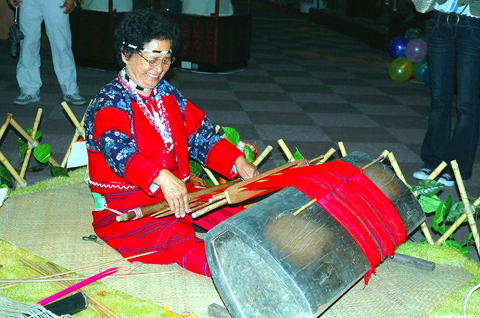A group of Aboriginal people who reside mainly in the border area between Hualien and Nantou counties were recognized yesterday as the Sediq, the country’s 14th distinct indigenous group.
At its regular weekly meeting, the Cabinet approved a proposal by the Council of Indigenous People to classify the Sediq as a separate group from the Atayal tribe.
Premier Chang Chun-hsiung (張俊雄) said that the approval was based on the spirit of “respecting the will of native people” and in accordance with the principle of “equality” enshrined in laws and regulations to guide the government’s Aboriginal policies.

PHOTO: CNA
“On behalf of the government, I hereby send my sincerest congratulations to the Sediq people on the restoration of their own tribe name,” Chang said.
Minister of the Council of Indigenous People Icyang Parod said the move would help the Sediq to “raise their self-identification and safeguard the tribe’s cultural heritage.”
The Sediq will have their own representatives on the council’s highest policy-making commission, Icyang said.
The council said there are about 6,000 to 7,000 Sediq.
The Japanese colonial government arbitrarily lumped together Aboriginal groups into “nine tribes” during its occupation of Taiwan, under which Taroko, Sediq and other groups were labeled as Sediq, a subgroup of the Atayal tribe.
The classification system was not challenged until the Democratic Progressive Party government came to power in 2000. It recognized the Tsao as the 10th tribe in 2001, followed by the recognition of the Kavalan, Taroko and the Sakizaya.
Ever since the recognition of the Taroko in January 2004, several negotiations had been held on whether the Sediq would agree to also use the name Taroko. But the discussions proved fruitless, as “both groups had been inconsistent on their specific names,” Icyang said.
The Sediq tribe filed an application with the council for recognition in April 2006.
The Cabinet decided to approve the recognition of the Sediq after a review committee under the direction of Minister-without-Portfolio Liu Yu-shan (劉玉山) concluded that the Sediq’s demand should be respected in accordance with the UN Declaration of Aboriginal Rights, Article 10 of the amendment to the Constitution and the Aboriginal Basic Law (原住民族基本法).
Wantan Diro, executive director of the Sediq Tribe Name Restoration Association, was excited yesterday by the Cabinet’s decision.
“Hallelujah! Thank God!” Watan said when asked by the Taipei Times for comment by telephone.
“I would like to thank Premier Chang for his decisiveness, the Council of Indigenous Peoples, the seven Aboriginal legislators and all the media organizations that have reported on our efforts [to gain recognition],” he said.
Wantan said that official recognition is not the end, but the beginning of another page in the tribe’s history.
“We will need to start organizing our tribal assembly, preparing for autonomy, building a tribal identity, and most importantly — revive, preserve and reform the Sediq language, culture, customs, sciences and education,” he said.
Wantan said that though several tribes have received official recognition in recent years, their people still do not feel attached to their new tribal identity.
“So we’re planning on a campaign with the goal to get at least 10,000 Sediqs to register themselves as Sediqs with the Household Registration Offices,” he said.
As for culture, Watan believed that, in addition to reviving and preserving the wisdom of the tribe’s ancestors, “we need to also reform some of it according to new technical or scientific developments and findings, so that our ancient knowledge won’t become outdated.”

Alain Robert, known as the "French Spider-Man," praised Alex Honnold as exceptionally well-prepared after the US climber completed a free solo ascent of Taipei 101 yesterday. Robert said Honnold's ascent of the 508m-tall skyscraper in just more than one-and-a-half hours without using safety ropes or equipment was a remarkable achievement. "This is my life," he said in an interview conducted in French, adding that he liked the feeling of being "on the edge of danger." The 63-year-old Frenchman climbed Taipei 101 using ropes in December 2004, taking about four hours to reach the top. On a one-to-10 scale of difficulty, Robert said Taipei 101

Nipah virus infection is to be officially listed as a category 5 notifiable infectious disease in Taiwan in March, while clinical treatment guidelines are being formulated, the Centers for Disease Control (CDC) said yesterday. With Nipah infections being reported in other countries and considering its relatively high fatality rate, the centers on Jan. 16 announced that it would be listed as a notifiable infectious disease to bolster the nation’s systematic early warning system and increase public awareness, the CDC said. Bangladesh reported four fatal cases last year in separate districts, with three linked to raw date palm sap consumption, CDC Epidemic Intelligence

Two Taiwanese prosecutors were questioned by Chinese security personnel at their hotel during a trip to China’s Henan Province this month, the Mainland Affairs Council (MAC) said yesterday. The officers had personal information on the prosecutors, including “when they were assigned to their posts, their work locations and job titles,” MAC Deputy Minister and spokesman Liang Wen-chieh (梁文傑) said. On top of asking about their agencies and positions, the officers also questioned the prosecutors about the Cross-Strait Joint Crime-Fighting and Judicial Mutual Assistance Agreement, a pact that serves as the framework for Taiwan-China cooperation on combating crime and providing judicial assistance, Liang

US climber Alex Honnold left Taiwan this morning a day after completing a free-solo ascent of Taipei 101, a feat that drew cheers from onlookers and gained widespread international attention. Honnold yesterday scaled the 101-story skyscraper without a rope or safety harness. The climb — the highest urban free-solo ascent ever attempted — took just more than 90 minutes and was streamed live on Netflix. It was covered by major international news outlets including CNN, the New York Times, the Guardian and the Wall Street Journal. As Honnold prepared to leave Taiwan today, he attracted a crowd when he and his wife, Sanni,